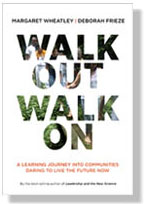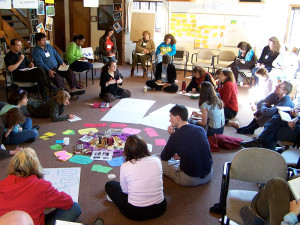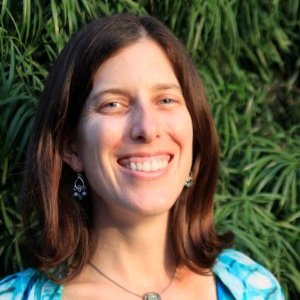This blog post series is a facilitated group study of the book Walk Out, Walk On by Margaret Wheatley and Deboarh Frieze. To read the last entry on India and Greece, click here.
 This week we make our final stop of our learning journey in the United States, where our friends in Columbus, Ohio teach us the Art of Hosting, an “operating system” that the Columbus community used to develop solutions to some of our most intractable problems, including hunger, health care, and homelessness. Through the Art of Hosting, communities have conversations that matter using a core set of principles, such as setting intention, creating hospitable space, asking powerful questions, surfacing collective intelligence, trusting emergence, harvesting learning, and turning wisdom into action (p. 199). Methods like the World Cafe invite collective intelligence to flourish and creative action to emerge.
This week we make our final stop of our learning journey in the United States, where our friends in Columbus, Ohio teach us the Art of Hosting, an “operating system” that the Columbus community used to develop solutions to some of our most intractable problems, including hunger, health care, and homelessness. Through the Art of Hosting, communities have conversations that matter using a core set of principles, such as setting intention, creating hospitable space, asking powerful questions, surfacing collective intelligence, trusting emergence, harvesting learning, and turning wisdom into action (p. 199). Methods like the World Cafe invite collective intelligence to flourish and creative action to emerge.
The Art of Hosting not only changes the way we have conversations, but also challenges our idea of what it means to be a leader. Tuesday Ryan-Hart, one of the hosting leaders in the Columbus community, explains the difference between a heroic leader and hosting leader. A heroic leader is someone who says “I have the answer and I need to figure out how to get you to come with me,” whereas a hosting leader says, “We know the answers- let’s figure out what to do together.” According to Tuesday, when we practice the Art of Hosting, “we are learning how to be together better” (p. 209).
After Columbus, we return home, perhaps where the real journey for all of us begins. We have learned so much from our friends in Mexico, Brazil, South Africa, Zimbabwe, India, Greece, the US. Now the task remains for us to consider: how do we apply what we learned in this learning journey in our own lives, work and communities?
Let’s review the core principles that emerged from Walk Out, Walk On (p. 220-225):
- Start anywhere, follow it everywhere.
- We make our path by walking it.
- We have what we need.
- The leaders we need are already here.
- We are living the worlds we want today.
- We walk at the pace of the slowest.
- We listen, even to the whispers.
- We turn to one another. Whatever the problem, community is the answer.
At the close, the authors share with us four practices that the Walk Ons use to sustain themselves (p. 226). They are:
- Naming – publicly claiming who we are and what we are walking on to.
How will you name yourself? - Connecting– finding others who share our purpose
Who will you connect with? - Nourishing – turning to each other for ideas, knowledge, practices and dreams
Where will you turn for nourishment? - Illuminating – sharing our stories so many more people ca know we’re out there and join in.
What stories will you illuminate?
Deborah Frieze also leaves us with additional questions for reflection (p. 232):
- How do I hold what I now know?
- How do I live in integrity with my beliefs?
- How can I hold my own hypocrisy with compassion?
- When do I engage and stay – and when do I walk out?
- What am I willing to walk on to?
But above all, Deborah reminds us that:
“Our work is to see what’s right in front of us and to step forward to claim it. And then, to keep seeing, to keep paying attention, to stay with the hard places, the uncomfortable relationships, the unanswerable questions…Our work is, over and over and over again, to choose to act” (p. 234).
We invite you to share your answers to the questions above, key takeaways from the reading, favorite quotes, and additional reflections in the comments section below. Please feel free to email education@mettacenter.org with any questions. We also highly encourage you to visit the Walk Out, Walk On home page for additional resources, stories, and links!
Thank you for your participation in this learning journey – we look forward to our continuing our journey, walking on, together!










[…] By Stephanie Knox Cubbon […]
As I reflect on this journey and have read these last pages in Ohio
and the struggle of poverty and health care, of homelessness and how at one point or another in our lives we have wanted a hero. Someone to end the cycle of struggle and “fix” it. The world does not work that way. On this journey the women and men who have worked hard in their communities in India, Africa, Greece may be looked upon as heroes but, they are people who had a vision and worked to make it happen. There have been times in my life when I have had a clear vision of what needed to be done and made it happen with other individuals; working together (that is when we as a society, as a community are at our best). If I had one dream it would be for the world to be at peace. No poverty, no war, no hate or division of class/sex/race anymore…Equality.
“If you were born a question, what would it be?” (Wheatley, M. and Freize, D, p. 193). This opened up a sacred space of reflection for me as did the rest of the chapter highlighting accomplishments in the United States toward constructive social change. I was reminded of the power of facilitating group reflection through the use of open space technology, the World Café methods and the hosting of circles also known as council (http://cis.ojaifoundation.org/). The reminder to create space for reflexive learning with the guidance to “listen with attention, speak with intention, and take care of the well-being of the group” is a simple strategy we can implement into our daily lives” (Wheatley, M. and Freize, D, p. 196). The facilitators featured in the book who gave these insightful instructions, Christina Baldwin and Ann Linnea offer additional wisdom to, “offer what you can; ask for what you need. Listen for what’s happening in the middle that nobody brought into the room but maybe we can all take out”. These words resonate with me in the space I am in now to train myself to listen when there is silence, remain rooted when I wish to flee, and open the depths of my spirit when I feel engulfed in the struggles that exist in this world. As I continue on my path as a “host” rather than a “hero”, I do so with humility and in the spirit of gratefulness to those who teach me in this journey. Thank you for the opportunity to participate in this collective learning experience in an attempt to create community as we attempt to follow the path to “walk on”.